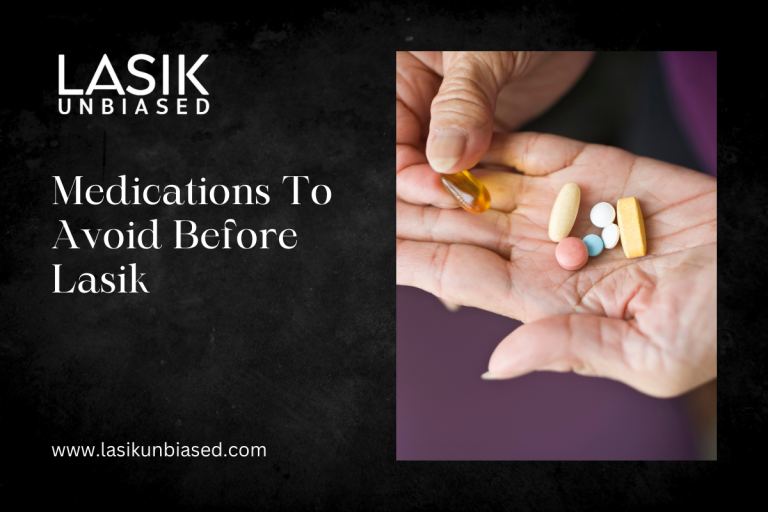LASIK (Laser-Assisted in Situ Keratomileusis) surgery is a life-changing procedure that can significantly improve vision by reshaping the cornea to allow light to focus on the retina properly. However, the success of LASIK depends on the surgeon’s skill and how well you prepare for the surgery. A critical aspect of preparation is reviewing the medications you are currently taking. Certain medications can affect the surgical process or the healing of your eyes after the surgery, so it is vital to understand which drugs should be avoided before LASIK.
This article will discuss various medications to avoid before LASIK and why they may impact your surgery or recovery.
Anticoagulants and Blood Thinners
Blood thinners are one of the most crucial medications to avoid before LASIK surgery. Blood-thinning drugs, such as warfarin (Coumadin), aspirin, or clopidogrel (Plavix), reduce the ability of your blood to clot. This is important for conditions like preventing heart attacks or strokes, but it can be problematic during LASIK surgery. If you are taking these medications, there is an increased risk of bleeding during the procedure, which could interfere with the delicate work required to reshape the cornea.
Additionally, these medications can affect your post-surgical healing. If you experience bleeding, it can slow down the healing process or cause complications. As a precaution, your surgeon will likely advise you to stop taking blood thinners several days or weeks before surgery, depending on your specific medication. It is essential to work closely with your ophthalmologist and primary care physician to find alternative drugs or management plans to safely discontinue blood thinners before LASIK.
Non-steroidal anti-inflammatory Drugs (NSAIDs)
NSAIDs, such as ibuprofen (Advil, Motrin), naproxen (Aleve), and aspirin, are commonly used to relieve pain, reduce inflammation, and lower fevers. However, these medications can pose significant risks before LASIK surgery. Like blood thinners, NSAIDs can increase the likelihood of bleeding, which could interfere with the surgery and recovery. Furthermore, NSAIDs can impact the natural healing process, leading to slower recovery times or an increased risk of developing complications, such as infections or scarring on the cornea.
Most surgeons will recommend that you stop taking NSAIDs at least one week before your LASIK procedure to minimize the risks. Additionally, if you are regularly using NSAIDs for a chronic condition, it is important to discuss alternative pain management strategies with your healthcare provider to ensure a smooth surgical experience.
Steroids
Corticosteroids, including oral steroids (such as prednisone) and topical steroids (such as hydrocortisone or prednisolone eye drops), are commonly prescribed to treat inflammation, allergies, and autoimmune disorders. While steroids are effective for managing these conditions, they can significantly affect the healing process after LASIK surgery. Steroids can reduce the body’s ability to repair tissue, which may delay the healing of the corneal flap created during LASIK. Additionally, using steroids can increase the risk of developing eye infections or complications such as glaucoma, which can hinder recovery or even cause long-term damage to your eyes.
If you are taking steroids for an existing condition, it is critical to discuss with your surgeon how to manage this medication before your LASIK surgery. Depending on the situation, your ophthalmologist may recommend discontinuing steroid use temporarily or switching to alternative treatments to help protect your eyes during recovery.
Certain Antidepressants and Anti-Anxiety Medications
Some individuals take antidepressants or anti-anxiety medications to manage conditions like depression, anxiety, or other mood disorders. Medications such as selective serotonin reuptake inhibitors (SSRIs), serotonin and norepinephrine reuptake inhibitors (SNRIs), and benzodiazepines can all impact the LASIK process. One of these medications’ most common side effects is dry eyes, which is already a concern after LASIK surgery. Dry eyes can prolong recovery and negatively affect visual clarity after the procedure.
Additionally, some of these medications can cause drowsiness, dizziness, or difficulty following instructions, which may interfere with your ability to cooperate during the pre-surgery or post-surgery process. It is essential to inform your surgeon about any psychiatric medications you are taking, as they may recommend temporary adjustments to your medication regimen or suggest alternative treatments to minimize risks.
Antibiotics and Antifungals
If you are currently taking antibiotics or antifungal medications, it is essential to consult with your ophthalmologist before undergoing LASIK surgery. While these medications are not typically harmful to LASIK, they may interact with other post-surgical treatments, such as eye drops. They can alter the natural balance of bacteria in your eyes. Any disruption to this balance could increase the risk of infection during recovery.
In some cases, your surgeon may advise you to avoid using antibiotics or antifungal medications unless necessary. If you are using these medications for a current infection, your ophthalmologist will guide you on managing them and ensure they do not interfere with the LASIK procedure.
Hormonal Medications
Hormonal medications, such as birth control pills, hormone replacement therapy (HRT), and other forms of hormonal regulation, are generally not a direct concern for LASIK surgery. However, certain hormonal medications can affect fluid retention, tear production, and other aspects of eye health, leading to dry eyes or irritation, typical side effects after LASIK. Hormonal fluctuations can also cause vision changes, especially in women undergoing hormonal treatments.
Although hormonal medications do not pose a direct risk to the LASIK procedure itself, it is still important to discuss any hormonal treatments you are using with your surgeon. They may provide recommendations to minimize side effects and optimize your eye health during healing.
Supplements and Herbal Remedies
In addition to prescription medications, certain over-the-counter supplements and herbal remedies can also pose risks before LASIK surgery. For example, supplements such as vitamin E, ginseng, and fish oil can have blood-thinning properties that may increase the risk of bleeding during surgery. Other supplements, such as St. John’s Wort, may interact with anaesthesia or other medications used during the procedure.
Inform your ophthalmologist about any supplements or herbal remedies you are taking, as they may need to be discontinued before surgery. Your surgeon will guide you on the proper course of action and ensure you are well-prepared for the procedure.


